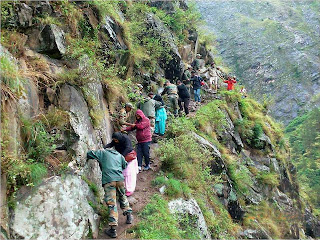 |
| M. KARUNANIDHI, HEAD, DMK |
 |
| KANIMOZHI, MP, RAJYA SABHA |

For Congress it does not matter if it supports an accused in the multi crore 2G scam for petty political gain – an alliance in Tamil Nadu for Lok Sabha elections. Scruples have no place in the ruling Congress Party at the Centre. Now the Party has decided to support M Karunanidhi’s daughter Kanimozhi in the Rajya Sabha elections in Tamil Nadu who will not be elected to the Upper House without the support of the Congress.
For DMK leader Karunanidhi, pretention is always better than practice. The DMK chief who broke the alliance with the UPA following arrest of his daughter and denial of bail in the 2G spectrum case and on Sri Lankan Tamils issue has no qualms in approaching the Congress to help Kanimozhi retain her Rajya Sabha seat. What matters most for the DMK is to go for the spoil of office and power. The CBI has charged Kanimozhi along with A Raja in the 2G scam. She was jailed cooling her heels for more than six months in Tihar before she was granted bail. She is facing prosecution trial in the special designated court of the CBI in Delhi.
The immediate fall out of this unholy deal will be dilution of the charges against A Raja, Kanimozhi and Dayanidhi Maran. The CBI will be asked to go slow in the case. The prosecution lawyers would put weak arguments during the trial and even prefer to hold evidence against the accused. The entire arrangement between the Congress and the DMK smacks of corruption and criminalization of politics.
Criminals in politics don’t necessarily mean murderers, rapists and dacoits. White collar criminals are equally dangerous to the society and the polity of the country.
See what the Congress spokesman Sandeep Dixit has to say about the deal- “People can go to jail, that does not mean they are guilty”. One should remind Dixit and his party leaders that there is something called probity in public life. The law of the land does allow people faced with charges including charges of murder and embezzlement of public money or making money in deals to contest elections. One is innocent till proved guilty. But it does not give a license to stuff Parliament and State Legislatures with criminals. It is the UPA Government and its investigating agency that has held the DMK leaders guilty of corruption charges. Prima facie there is strong case against these leaders. It was precisely for this reason that the Prime Minister sacked A Raja from the Union Council of Ministers. It also removed Dayanidhi Maran because of corruption charges. Suddenly it finds that ‘corruption’ is no issue and there is no harm in ignoring the charges if it suits the political convenience of the ruling party.
The Congress also came forward with ridiculous argument in favour of the deal. Its leaders say that the Congress fears the prospects of J Jayalaliths and her Party the AIADMK to join hands with the BJP and Narendra Modi in the next Lok Sabha elections, hence better to join hands with Karunaidhi and his DMK to counter the BJP move in Tamil Nadu.
I wonder, one day the Congress and its partners may even justify rehabilitating all corrupt and criminals in the country in the name of ‘Modi’- to keep the BJP leader out of the race. This is not going to help, more they shout ‘bhago bhago Modi aya’, more it will harm itself in politics.
~R. K. Sinha












